Research Area E - Publications 2010
28-Dec-2010
Biochemistry, 2010, DOI: 10.1021/bi101858g, 50 (5), pp 910–916 published on 28.12.2010
Biochemistry, online article
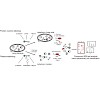
The discovery of novel and unique target−drug pairs for the treatment of human diseases such as cancer and bacterial infections is an urgent goal of chemical and pharmaceutical sciences. Natural products represent an inspiring source of compounds for designing chemical biology methods with applications in target identification and characterization. Inspired by ...
23-Dec-2010
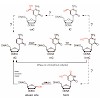
5–Hydroxymethylcytosine (hmC) was recently detected as the sixth base in mammalian tissue at so far controversial levels. The function of the modified base is currently unknown, but it is certain that the base is generated from 5-methylcytosine (mC). This fuels the hypothesis that it represents an intermediate of an active demethylation process, which could ...
10-Dec-2010
Journal of Molecular Biology,, 2010, doi:10.1016/j.jmb.2010.09.050, Volume 404, Issue 4, Pages 600-610 published on 10.12.2010
Journal of Molecular Biology, online article
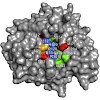
IspG protein serves as the penultimate enzyme of the recently discovered non-mevalonate pathway for the biosynthesis of the universal isoprenoid precursors, isopentenyl diphosphate and dimethylallyl diphosphate. The enzyme catalyzes the reductive ring opening of 2C-methyl-d-erythritol 2,4-cyclodiphosphate, which affords 1-hydroxy-2-methyl-2-(E)-butenyl ...
09-Dec-2010
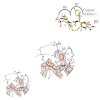
The proteasome's participation in essential biological processes such as stress response, cell proliferation, apoptosis, and antigen presentation has been well established.[1] It is, therefore, not surprising that academia and the pharmaceutical industry have made efforts to develop a range of small synthetic inhibitors against this proteolytic molecular machine ...
03-Dec-2010
Analytical Biochemistry, online article
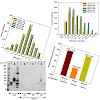
The filter-aided sample preparation (FASP) method allows gel-free processing of biological samples sol- ubilized with detergents for proteomic analysis by mass spectrometry. In FASP detergents are removed by ultrafiltration, and after protein digestion peptides are separated from undigested material. Here we compare the effectiveness of different filtration ...
18-Nov-2010
Org. Letters, online article
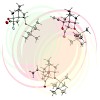
A synthetic strategy toward maoecrystal V has been identified. It has been shaped by the necessity to maneuver in sterically hindered molecular environments.
12-Nov-2010
PNAS, 2010, vol. 107 no. 48 20720-20725, doi: 10.1073/pnas.1008894107 published on 12.11.2010
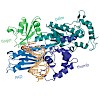
Heterocyclic aromatic amines produce bulky C8 guanine lesions in vivo, which interfere and disrupt DNA and RNA synthesis. These lesions are consequently strong replication blocks. In addition bulky adducts give rise to point and frameshift mutations. The translesion synthesis (TLS) DNA polymerase Eta is able to bypass slowly C8 bulky adduct lesions such as the ...
09-Nov-2010
PNAS, 2010, doi: 10.1073/pnas.1009124107, vol. 107 no. 45 19260-19265 published on 09.11.2010
PNAS, online article

Ferredoxin:NADPH oxidoreductase (FNR) is a key enzyme of photosynthetic electron transport required for generation of reduction equivalents. Recently, two proteins were found to be involved in membrane-anchoring of FNR by specific interaction via a conserved Ser/Pro-rich motif: Tic62 and Trol. Our crystallographic study reveals that the FNR-binding motif, which ...
06-Nov-2010
Molecular & Cellular Proteomics, 2010, doi: 10.1074/mcp.M110.003830, published on 06.11.2010
Molecular & Cellular Proteomics, online article

Large scale phosphorylation analysis is more and more getting into focus of proteomic research. While it is now possible to identify thousands of phosphorylated peptides in a biological system, confident site localization remains challenging. Here we validate the Mascot Delta Score (MD score) as a simple method that achieves similar sensitivity and specificity ...
20-Oct-2010
Biophysical Journal, 2010, doi:10.1016/j.bpj.2010.08.031, Volume 99, Issue 8, 2541-2549 published on 20.10.2010
Biophysical Journal, online article
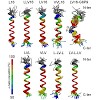
The transmembrane domains (TMDs) of membrane-fusogenic proteins contain an overabundance of b-branched residues. In a previous effort to systematically study the relation among valine content, fusogenicity, and helix dynamics, we developed model TMDs that we termed LV-peptides. The content and position of valine in LV-peptides determine their fusogenicity and ...
08-Oct-2010
Chem. Commun., online article
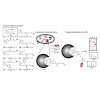
Target analysis of acivicin derived 3-halodihydroisoxazoles scaffolds in living non-pathogenic and pathogenic bacteria.
04-Oct-2010
Angewandte Chemie, 2010, DOI: 10.1002/anie.201000833, Volume 49, Issue 47, pages 8802–8809 published on 04.10.2010
Angewandte Chemie, online article
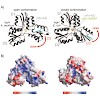
The biosynthesis of natural products is a treasure trove of unusual reaction mechanisms. This Minireview summarizes recent work on the structure and mechanism of IspH protein, which catalyzes the reductive dehydroxylation of an allyl alcohol in a biosynthetic pathway leading to isoprenoid precursors.
19-Sep-2010
Bioorganic & Medicinal Chemistry, online article
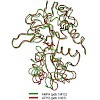
The impact of structural biology on the design of ligands (agonists, antagonists and modulators) for ionotropic glutamate receptors is reviewed.
08-Sep-2010
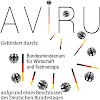
CIPSM spin-off AVIRU stands for anti virulence and is a biotechnology start-up that is currently funded as an EXIST transfer of technology project by the German Federal Ministry of Economics and Technology in compliance with a resolution of the German Parliament. AVIRU aims to develop the proof-of-concept for an innovative anti-infective drug for the treatment of ...
18-Aug-2010
ChemMedChem, online article
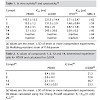
Although there are potent antimalarial drugs available, the spread of drug resistance has led to an increase in morbidity and mortality rates in malaria-endemic regions. To overcome these problems, new antimalarial drugs with novel modes of action have to be developed. The recently discovered nonmevalonate pathway of isoprenoid biosynthesis (MEP pathway) is an ...
16-Aug-2010
ChemMedChem, online article
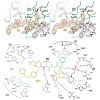
The ubiquitin-proteasome system (UPS) is responsible for the controlled degradation of proteins in eukaryotic cells through conjugation of ubiquitin molecules and subsequent cleavage by a multimeric protein complex known as the 26S proteasome. Proteolysis occurs within the 20S proteasome core particle (CP), a large barrel-shaped protein complex composed of four ...
14-Aug-2010
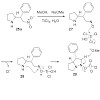
The first total synthesis of newbouldine has been achieved employing a new, reductive N - N bond forming reaction. The asymmetric synthesis confirms that the natural product is a racemate.
19-Jul-2010
Angewandte Chemie, 2010, 49, 35, 6199 - 6202 published on 19.07.2010
Angewandte Chemie, online article
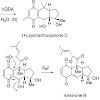
Diels–Alder reactions of vinyl quinones may provide a rapid entry to highly functionalized bi- and polycyclic ring systems. They involve the inverse-electron-demand cycloaddition of a suitable dienophile to a vinyl quinone, which presumably generates an “isoquinone methide” (Scheme 1). This reactive intermediate could then tautomerize in several ways to yield ...
19-Jul-2010

LC-MS has allowed the amount of the post-replicatively formed DNA base 5-hydroxymethylcytosine (see picture; left) to be quantified in brain tissue. The nucleoside is most abundant in areas that are associated with higher cognitive functions, and its content in mouse hippocampi seems to increase with age. The new method enables hydroxymethylcytosine to be ...
12-Jul-2010
European Journal of Organic Chemistry, 2010, DOI: 10.1002/ejoc.201090055, Volume 2010, Issue 21, page n/a published on 12.07.2010
European Journal of Organic Chemistry, online article

A convergent synthesis of SylA was developed and consists of the synthesis of a fully functionalized macrocycle, which is subsequently coupled with a urea moiety. For cyclization, ring-closing metathesis of a conformationally preorganized precursor was employed. The established synthetic route was then applied to the synthesis of SylA derivatives by using various ...
09-Jul-2010
Nature Biotechnology, 2010, doi:10.1038/nbt.1658, Pages: 695–709 published on 09.07.2010
Nature Biotechnology, online article
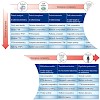
The evolution of mass spectrometry–based proteomic technologies has advanced our understanding of the complex and dynamic nature of proteomes while concurrently revealing that no ‘one-size-fits-all’ proteomic strategy can be used to address all biological questions. Whereas some techniques, such as those for analyzing protein complexes, have matured and are ...
07-Jul-2010
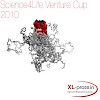
CIPSM spin-off XL-protein with its revolutionary PASylation technology has been awarded the Science4Life Venture Cup 2010 for its excellent business concept for the development of novel biologics with prolonged action. XL-biologics, a spin-off of XL-protein, will focus on the development of superior biopharmaceuticals with extended plasma half-life utilising the ...
15-Jun-2010
SYNTHESIS, online article
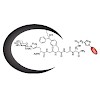
Glycoside hydrolases represent a large class of enzymes that cleave carbohydrate motifs. Since some enzymes play crucial roles in bacterial resistance pathways, we here introduce the synthesis and application of small sugar-based probes to study the function of the glycoside hydrolase NagZ.
10-Jun-2010
Trends in Biochemical Science, 2010, doi:10.1016/j.tibs.2010.05.005, Volume 35, Issue 11, Pages 634-642 published on 10.06.2010
Trends in Biochemical Science, online article
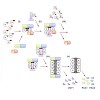
The heart of the ubiquitin-mediated degradation pathway, the 26S proteasome, endoproteolytically cleaves most intracellular proteins, thereby maintaining biological homeostasis and regulating many crucial processes in the cell. This hydrolyzing machine comprises more than 30 different subunits, which perform different functions including the recognition, ...
19-May-2010

In order to amaze our next generations for science and chemistry in particular, CIPSM hosted a two day event at an elementary school with lots of do-it-yourself experiments for the school kids. On the first day (11th of May) Oliver Baron gave an experimentary lecture with lots of explosions and "magical" reactions at the Department of Chemistry of the LMU for ...
16-May-2010
J. Proteome Research, online article
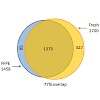
Tissue samples in biobanks are typically formalin-fixed and paraffin-embedded (FFPE), in which form they are preserved for decades. It has only recently been shown that proteins in FFPE tissues can be identified by mass spectrometry-based proteomics but analysis of post-translational modifications is thought to be difficult or impossible. The filter aided sample ...
12-May-2010
Grundschule an der Würm Stockdorf

CIPSM hosts a two day event at an elementary school with lots of do-it-yourself experiments for the school kids. On the first day (11th of May) Oliver Baron gives a experimentary lecture at the Department of Chemistry of the LMU for around 300 kids focusing on water and matter in general. The following day the kids can experiment themselves and get a first ...
04-May-2010
Bayerische Staatsregierung
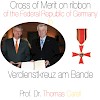
CIPSM speaker Thomas Carell was honored today by the Bavarian Prime Minister Horst Seehofer with the Cross of Merit on ribbon of the Federal Republic of Germany.
30-Apr-2010
JACS, 2010, DOI: 10.1021/ja909150y, pp 6964–6972 published on 30.04.2010
JACS, online article
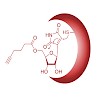
Showdomycin is a potent nucleoside antibiotic that displays a high structural similarity to uridine and pseudouridine. No detailed target analysis of this very unusual electrophilic natural product has been carried out so far. To unravel its biological function, we synthesized a showdomycin probe that can be appended with a fluorophor or a biotin marker via click ...
26-Apr-2010
J. Proteome Research, online article
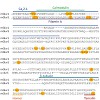
Taking advantage of the recently developed Filter Assisted Sample Preparation (FASP) method for sample preparation, we performed an in-depth analysis of phosphorylation sites in mouse brain. To maximize the number of detected phosphorylation sites, we fractionated proteins by size exclusion chromatography (SEC) or separated tryptic peptides on an anion exchanger ...
08-Apr-2010

Solutions of allyl indium reagents formed in the reactions of indium with allyl bromide and allyl iodide, respectively, in N,N-dimethylformamide, tetrahydrofuran, and water were analyzed by a combination of electrospray-ionization mass spectrometry, temperature-dependent 1H NMR spectroscopy, and electrical conductivity measurements. Additional mass spectrometric ...
23-Mar-2010
Angewandte Chemie, 2010, Volume 49, Issue 15, pages 2680–2698, DOI: 10.1002/anie.200905352; pages 2680–2698 published on 23.03.2010
Angewandte Chemie, online article
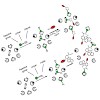
Activity-based protein profiling (ABPP) has matured into a standard method for the fast, sensitive, and selective identification of enzyme activity and inhibitors in proteomes. By using natural product based probes, the targets of many uncharacterized molecules can be easily identified in complex proteomes, and their exact function and mechanism of action ...
23-Mar-2010
Angewandte Chemie International Edition, online article
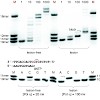
Flipped out: The cisplatin-(1,3-GTG) adduct, a strongly cytotoxic DNA lesion generated by the action of cisplatin therapeutics, is partially bypassed by Y-family DNA polymerase . Crystal structure data on this DNA-protein complex explain the partial-bypass process. The central dT unit of the lesion is turned out and blocks the movement of the enzyme along the DNA ...
18-Feb-2010
Chemistry - A European Journal, online article
Small metal clusters fill the gap between the atomic scale and the metallic state with its distinctive bulk phenomena.[1] Besides being of high fundamental interest, this intermediate character of metal clusters also gives rise to unique and potentially useful electronic, magnetic, and optical properties.[ 2] To bring these properties to real-world applications, ...
18-Feb-2010
J. Am. Chem. Soc., 2010, 132(10), 3254–3255, doi: 10.1021/ja910917f published on 18.02.2010
Journal of the American Chemical Society, online article
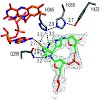
Repair of the Dewar valence isomers by (6-4) photolyases proceeds via an enzyme catalyzed ring-opening reaction of the Dewar lesion to the (6-4) photoproduct.
19-Jan-2010
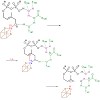
Isopentenyl diphosphate (IPP) and dimethylallyl diphosphate (DMAPP) represent the two central intermediates in the biosynthesis of isoprenoids. The recently discovered deoxyxylulose 5-phosphate pathway generates a mixture of IPP and DMAPP in its final step by reductive dehydroxylation of 1-hydroxy-2-methyl-2-butenyl 4-diphosphate. This conversion is catalyzed by ...
01-Jan-2010
Molecular Membrane Biology, online article
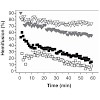
The transmembrane domains of fusion proteins areknownto beimportant for their fusogenic activity. Inaneffort to systematically investigate the structure/function relationships of transmembrane domains we had previously designed LV-peptides that mimic natural fusion proteinTMDsin their ability to drive fusion after incorporation into liposomalmembranes. ...










